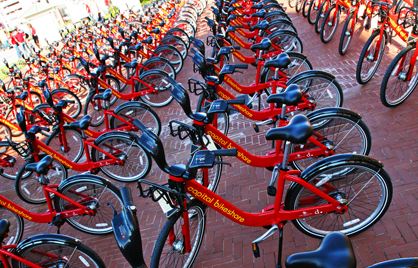In 2007, Boston had one city block of bike lane. It was considered one of the world’s least bike-friendly cities. But Mayor Thomas Menino set out to change all that. The Boston Globe reports that today, Menino signed an agreement to create a bike-sharing network in the style of Washington, D.C.’s Capital Bikeshare and Paris’ Vélib’.

The $6 million, 600-bike system, called the Hubway as a clever play on Boston’s nickname “Hub of the Universe” (funny, I thought D.C. was the hub of the universe), is set to open in July. Boston officials envision it expanding to 5,000 bikes at more than 300 kiosks, a size which would eclipse D.C.’s current 1,100 bikes.
The bike-share and bicycle network are, in part, a way for Boston to complement its historic transit system. Proponents often point to the usefulness of bicycling for “last-mile connectivity,” helping people get the final stretch from the transit stop to their destination. The Federal Transit Administration acknowledged that potential and awarded Boston’s bike-share program $3 million last year.
Planners are hoping the Hubway will generate 100,000 trips in its first year, but the city isn’t on the hook if ridership is disappointing – Alta Bicycle Share, the company which will build and operate the Hubway, bears the risk.
The logistics will be similar to other systems – the first 30 minutes will be free, daily and yearly memberships are available for $5 to $85 – but Boston is requiring riders to sign a pledge to wear a helmet, according to the Globe. Other systems don’t require this, though they do provide safety information encouraging helmet use. Australia’s bike-share system does require helmets and has a system for buying and renting helmets – but the clunkiness of the arrangement has helped make Australia’s an underperforming system. Boston’s system will also close for three months during the winter, unlike D.C.’s system which boasted near-record ridership in February.
Cambridge, Brookline, and Somerville, surrounding cities that comprise metropolitan Boston, are also working on their contracts. In the end, it will be one “seamless” system linking them all, according to Eric Bourassa, transportation manager for the Metropolitan Area Planning Council.
Mayor Menino has been in office since 1993, presiding over some of the darkest years of Boston’s bicycle-unfriendliness. But in 2007, he launched a major bicycling initiative, adding 38 miles of bike lanes, 1,600 bike parking spots, its own bicycle-friendly business award program and now the 600-bike Hubway.
“I think Boston is ready to embrace that size of a bike-share system,” said Carly Sieff of the League of American Bicyclists’ Bicycle Friendly America program. “You need to have the infrastructure and education – for both motorists and cyclists – if you’re preparing to have that many bikes on the road. Based on their progress the last couple years, I think they’re well on their way.”





